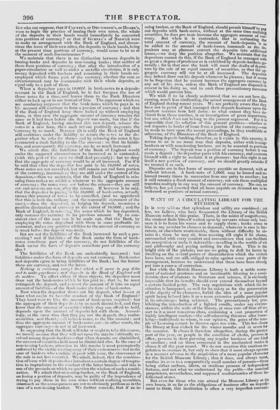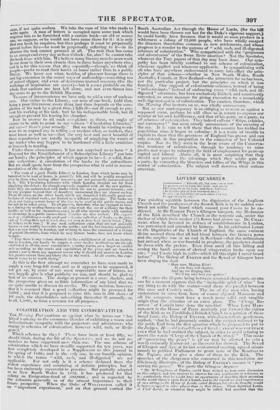WANT OF A CIRCULATING LIBRARY FOR THE STUDIOUS.
IT is very seldom that splendour and utility are combined; yet few, we believe, who have frequented the Library of the British Museum refuse it this praise. There, in the midst of magnificence, the student finds himself waited upon by servants whose only busi- ness it is to learn his wants and to supply them ; books come to him in any number he chooses to demand; whatever is rare in lite- rature, or elsewhere unattainable, there without difficulty he ob- tains it ; there he may sit, from morning till night if he choose, surrounded with every comfort and convenience that can facilitate his occupation or make it delectable—revelling in the worlds of wit and philosophy and paying nothing for the feast. This is the bright side of the picture; nor are we going to dull its lustre by dwelling on the several points of dissatisfaction which the visiters have been, and are still, obliged to raise against sonic parts of the management, because we understand that these have been already put into a course of correction. IT is very seldom that splendour and utility are combined; yet few, we believe, who have frequented the Library of the British Museum refuse it this praise. There, in the midst of magnificence, the student finds himself waited upon by servants whose only busi- ness it is to learn his wants and to supply them ; books come to him in any number he chooses to demand; whatever is rare in lite- rature, or elsewhere unattainable, there without difficulty he ob- tains it ; there he may sit, from morning till night if he choose, surrounded with every comfort and convenience that can facilitate his occupation or make it delectable—revelling in the worlds of wit and philosophy and paying nothing for the feast. This is the bright side of the picture; nor are we going to dull its lustre by dwelling on the several points of dissatisfaction which the visiters have been, and are still, obliged to raise against sonic parts of the management, because we understand that these have been already put into a course of correction.
But while the British Museum Library is both a noble monu- ment of national greatness and an inestimable blessing to a consi- derable class of students in literature and science, it is obviously impossible that its benefits should ever extend themselves beyond a certain limited point. The very regulations with which the in- stitution is hampered, as well for its safety as for the preservation of the dignity of its character, forbid the idea of a more popular spirit being infused into it or a more extensive public participation in its advantages being achieved. The precautionary law, pro- hibiting the introduction of a lighted candle, under any circum- stances, within the walls of the library, at once cuts off from all re- sort to it a most numerous class, containing a vast proportion of highly intelligent readers—the self-educating thirsters idler know- ledge—individuals to whom, in our opinion, the gates of the tem- ple of Learning cannot be thrown open too wide. This law closes the library at lbw o'clock for the winter months and at seven for the summer. It closes it therefore altogether, during the greater part of the year, on people in the condition of clerks, persons in office, persons in short pursuing any regular business of one kind or another ; and on those concerned in the mechanical trades it closes it all the year round. We do not mention this cautious re- gulation to censure it, but only to show that it must always operate in a manner adverse to the acquisition of a more popular character for time British Museum Library ; that it does, and always must, confine its ures to a comparatively small number of persons—these being either authors, idlers, or studious persons of independent fortune, and not what we understand by the public—the nominal in-
tellectual nevertheless, and supposed usufructuarics of these n- tellect ual stores.
But even for those who can attend the Museum Library at its own hours, in so far as the obligations of' business offer no impedr ment to them, this institution is often a very imperfect convent-
once, if not quite useless. We take the case of him who reads to write again. A man of letters is occupied upon some task which requires him to be furnished with a certain book—an old or scarce me, we suppose, or he would not have come there for it : it is only that one book he requires, but then perhaps it must be perpetually spread before him—he must be perpetually referring to it—in its absence the task cannot proceed at all. The task then has come to an abrupt end every day at four o'clock ; for, alas ! he cannot take thebook home with him. We believe many literary men do more work in one hour in their own closets than in three hours anywhere else ; and it is for this reason that they especially—though, we think all people—pretbr to read their books at home rather than in a public library. We know not what, besides, of pleasant lounge there is and leg-extension in the secret ways of authorship—something too of poised slipper, and even of dexterous manual recovery (for the workings of inspiration are secret)—but it seems probable on the whole that authors are best left alone, and not even thrust into day-coats to go to the British Museum.
To eases of inconvenience we have only to add a case of useless- ness. Our nailer to the Library, our man of one book, (add that, being a poor littiwateur, every thing just then depends on the com- pletion of his task by a given time.) falls ill—not ill enough to pre- vent his working at his task, had he his indispensable book, but ill enough to prevent his leaving his chamber.
Now in answer to all such complaints as these, we ought of course to be able to point to our various " Circulating Libraries," and say—" there's your remedy." But we should be wasting words were we to expend any in telling cur readers what, as readers, they must know as well as we—that the very best and most boastful of these repositories are totally incapable of supplying the wants of any reader who may happen to be burdened with a little erudition or research in reading. Under these circumstances, it has not surprised us to have " A Proposal tbr the Establishment of a Subscription Library" put into our hands; the principles of which appear to be—l. a solid, first- rate collection ; 2. circulation of the books to the subscribers. But we shall quote here from the prospectus what is said in recom- mendation of the design.
"The want of a good Public Library in London from which books may be borrowed to be read at home, is generally felt, and will be readily recognized even by those who, having other resources, are not personally inconvenienced by it. The Circulating Libraries with which London abounds are far from supplying this detect ; for though copiously supplied with all the new publica• tions, they are unfurnished with books which are not in general demand; and for any purpose beyond that of desultory amusement they are almost useless. Those libraries, on the other band, which are furnished with really good col- lections of standard works, are framed on a different principle. The books are given out during certain hours of I he day, to he rend in the public rooms, and :ire not to be taken away. To all persons, therefore, who are engaged in busi- ness during the reading-hours—to all who want the use of a library for their families as well as for themselves—am. to all who cannot study with comfort or advantage in a public room—these !Lraries are also useless. The experi- ment ,;( ..stoblishiny a really ;mod and ,,xtensive collection of books, On thejwin- eirle of ailing them n` Out to read, does :a seem to hare been fairly tried. [This we believe to he true.] If any such collections exist. they are not generally known cr not readily accessible' to the public ; and the fact remains undeniable, that a person living in London, and wishing to have the command of a library of general literature, from which he may borrow books, does not know where to apply.
" That there is any serious obstacle to the establishment of such an institu- tion in London, can hardly be supposed, since similar institutions arc already established in all the more considerable country-towns, on a larger or smaller scale according to the wants and capabilities of the place, and are found to answer ; nor is there any apparent reason why it should not answer in London ton greater extent than anywhere else in the world. At all events, the expe- riment seems to be worth trying."
As this is the first attempt we remember to have seen made to supply a very long-felt want, and as it appears to be supported, if not got up, by some of our moat respectable men of letters, we very happily give it what publicity we can, and should be glad to hear of its success. The design at present is a mere shadow, and the prospectus gives us so little information of any kind that we arc quite unable to discuss its merits. We may mention, however, that it is assumed that a good collection might be procured for 5,000!.; and that it is proposed to raise this sum in 500 shares of 10/, each, the shareholders subscribing thereafter 3/. annually, or, in all, 1,500/., to form a revenue tbr all purposes.



























 Previous page
Previous page